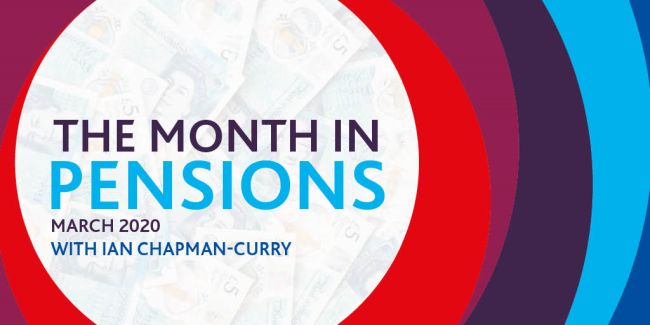Business continuity plans (BCPs) have, for a long time, been on the radar for many trustees. With The Pension Regulator's (TPR) focus managing risk, many boards have sat through the creation, review and update of a risk register. TPR's example risk register covers the mundane (member data being incomplete or inaccurate) and the more exotic (fires and floods). But it doesn't include what to do in the event of a pandemic so serious that normal life is suspended for weeks, months and perhaps even longer.
Download the full PDF version of this document.

TPR has created an online information page (COVID-19: an update for trustees, employers and administrators) which will be kept updated. We've also produced an Insight focusing on practical steps ( COVID-19 and pensions: practical steps for UK trustees). Some of the key messages are that it is now time to put in place your BCPs and to consider whether they remain adequate. Trustees should also make it clear which activities should be prioritised in the event of under-resourcing, such as pensioner payments, retirement processing and bereavement payments. There will be testing times ahead, but trustees and their advisers have been thinking about this sort of thing for a long time. Now it is time to put the theory into practice.
Pensions policy
Pension Schemes Bill 2019-21 update
The Pension Schemes Bill 2019-2021 has completed its committee stage in the House of Lords. The first and second sittings of the committee took place on 24 and 26 February 2020 and the third and fourth sittings of the committee took place on 2 and 4 March 2020. Amendments that have been formally agreed to, include
- regulation-making powers to enable the DWP to impose additional governance duties on occupational pension scheme trustees in relation to climate change risk; and
- an extension of the new limitations on transfer rights so that they also apply to unfunded public sector schemes.
The Bill now moves to its report stage in the House of Lords. No date for this has been announced as yet. In addition, we know that the emergency parliamentary time alloted to the Coronavirus Bill 2019-21 has impacted on the timetable. The parliamentary web page for the Pension Schemes Bill 2019-21 is available here.
Pension payments and taxation
Key pension points from Budget 2020
The Chancellor of the Exchequer, Rishi Sunak, delivered his first Budget speech on 11th March 2020. Whilst the Chancellor didn't overhaul the entire pensions tax relief system, he did announce some important changes in relation to one aspect of it, namely the annual allowance taper. Broadly, changes have been made to the earnings and adjusted income thresholds and also to the minimum annual allowance. The changes will apply to high earners in both the public and private sectors and will be introduced for the next tax year (i.e. 2020/2021.
Trustees will need to make sure that their scheme administrators update their systems to take account of these changes for the new tax year. Employers may also need to review any arrangements they have in place for employees which are built around the minimum annual allowance given that this is to be reduced from £10,000 to £4,000.
- View the full text of HM Treasury's Budget 2020; and
- Visit the online resource for HMRC pensions tax changes to income thresholds for calculating the tapered annual allowance.
Scheme investment, funding and the PPF
TPR launches consultation on revised defined benefit funding code of practice
This month, TPR launched the first part of its consultation on how it intends to use new powers set out in the Pension Schemes Bill 2019-20 (the Bill) in respect of employer funding of defined benefit pension schemes (click here for TPR's consultation homepage). The consultation marks another key stage in delivering on the Government's 2018 white paper 'Protecting Defined Benefit Pension Schemes'. The consultation outlines a range of overarching key principles and sets out a new, twin-track regulatory approach (a 'fast track' option and a 'bespoke' option).
One of the areas that has attracted a lot of attention in the Bill is the introduction of a statutory obligation for trustees to set a 'long-term objective'. The consultation provides far more detail on what this will entail in practice. For many schemes, the process of setting a long- term objective will see trustees having to have frank discussions with sponsoring employers about exactly where the scheme is heading - is it self-sufficiency or buy-out and what is the anticipated timeframe? Having a common objective in mind may then take some of the pain out of valuation negotiations. In addition, TPR's emphasis of the importance of the employer covenant and comments on the length of time on which it can be relied upon will be of interest across the pensions industry.
Pensions Climate Risk Industry Group launches consultation
The Pensions Climate Risk Industry Group (PCRIG) has published a public consultation on guidance for trustees of occupational pension schemes on how to address climate change risk (Aligning your Pension Scheme with the TCFD Recommendations).
The guidance is aimed at trustees of both defined benefit (DB) and defined contribution (DC) occupational pension schemes. The consultation closes on 7 May 2020. his is a further reminder that trustees of occupational pension schemes cannot avoid ESG issues, including climate risk, when considering and implementing their investment strategy. The guidance will be a useful tool for trusteesas it focuses on how trustees should consider climate risk issues within their governance and decision-making processes.
The guidance follows on from amendments to the Pension Schemes Bill 2019-2021 in relation to new climate change risk governance requirements.
Government consults on aligning RPI with CPIH
The Government is consulting on bringing RPI and CPI together, by aligning RPI with CPIH (CPIH being a variant of of CPI and includes owner-occupier housing costs). The impact is likely to be material in cost terms, and there will be winners and losers, depending on what the scheme rules say, what the scheme liabilities are and where scheme funds are invested or hedged. Consequently the Government is seeking to deepen its understanding of the range of impacts the proposed change might have. You may also find our detailed Insight on the consultation RPI or CPI - beyond pension increases useful.
April 2020 in pensions
- 1 April 2020 - the Occupational and Personal Pension Schemes (General Levy) (Amendment) Regulations 2020 come into force.
- 6 April 2020 - HMRC becomes a secondary preferential creditor giving it greater priority for recovery of certain taxes from insolvent businesses.
- 6 April 2020 - the legislation to complete the Competition and Markets Authority's recommendations for trustee oversight of investment consultants and fiduciary managers comes into force (Occupational Pension Schemes (Governance and Registration) (Amendment) Regulations 2019.
- 22 April 2020 - consultation on proposed changes to the Retail Prices Index (RPI) closes.
Read the original article on GowlingWLG.com.
The content of this article is intended to provide a general guide to the subject matter. Specialist advice should be sought about your specific circumstances.
